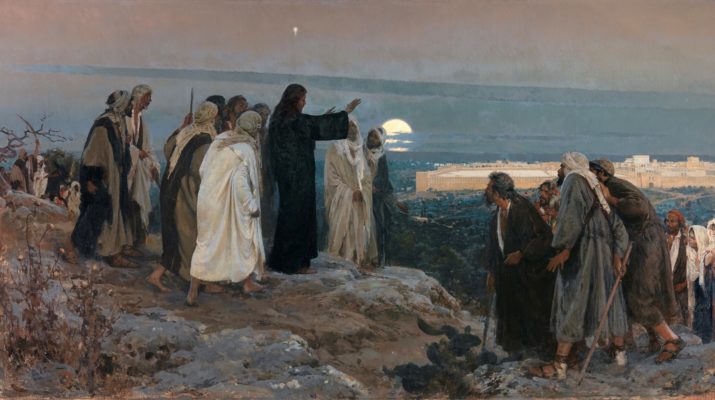Mark 13:1-8
Ordinary B51
1 As he cameA out of the temple,B oneC of his disciplesD said to him,
A “came” = ekporeuomai. From ek (from, from out of) + poreuomai (to go, travel, journey, die; refers to transporting things from one place to another; focuses on the personal significance of the destination); {from poros (passageway)}. This is to go forth, depart from, be spoken, flow out, project. This word emphasizes the result a process or passage – how it impacts the person or thing.
B “temple” = hieron. From hieros (sacred, something sacred, temple, holy, set apart; something consecrated to a god). This is the word for temple.
C “one” = heis. This is one, a person, only, some.
D “disciples” = mathetes. From matheteuo (to make a disciple of); from manthano (to learn key facts, gain knowledge from experience; generally implies reflection as part of the learning process); from math– (thinking things through). This is a disciple, learner, or student. It is where we get “mathematics” from.
“Look,E Teacher,F what large stonesG and what large buildings!”H
E “look” = idou. From eido (to be aware, see, know, remember, appreciate). This is see! Lo! Behold! Look! Used to express surprise and or draw attention to the statement.
F “Teacher” = Didaskalos. From didasko (to teach, direct, instruct, or impart knowledge; in the New Testament, almost always used for teaching scripture); from dao (to learn). This is teacher or master.
G “stones” = lithos. This is stone in a literal or figurative sense.
H “large buildings” = oikodome. 18x in NT. From oikos (house – the building, the household, the family, descendants; the temple) + doma (house, housetop; often used to refer to the roof) {from demo (to build a house)}. This is the act of building, structure, architecture, a building, upbuilding. It is a building that is used as a home. Figuratively, this refers to spiritual progress – becoming a person who is a better home in which God can reside.
2 Then JesusI asked him, “Do you seeJ these greatK buildings? Not one stone will be leftL here upon another;M all will be thrown down.”N
I “Jesus” = Iesous. From Hebrew Yehoshua (Joshua, the Lord is salvation); {from YHVH (proper name of the God of Israel; the self-existent and eternal one); {from havah (to become) or from hayah (to come to pass, become, be)} + yasha (to deliver, defend, help, preserve, rescue; properly, to be open, wide or free, which implies being safe. So, in a causative sense, this is to free someone)}. This is Jesus or Joshua in Greek – the Lord saves or the Lord is salvation.
J “see” = blepo. This is literally to see – it is primarily used in the physical sense. However, figuratively it can be seeing, which includes attention and so to watchfulness, being observant, perceiving, and acting on the visual information. It can also mean beware.
K “great” = megas. This is big in a literal or figurative sense – great, large, exceeding, abundant, high, mighty, perfect, strong, etc.
L “be left” = aphiemi. From apo (from, away from) + hiemi (to send). This is send away, release, permit, forgive, allow to depart, discharge, or send forth.
M “another” = lithos. Same as “stones” in v1. See note G above.
N “thrown down” = kataluo. 17x in NT. From kata (down, against, throughout, among) + luo (to loose, release, untie; figuratively, to break, destroy, or annul; releasing what had been withheld). Literally, this means thoroughly loosening. It can mean unharnessing or unyoking animals and so to lodge somewhere for a night. It can also mean to disintegrate or demolish in a literal or figurative sense. So, it can be destroy, overthrow, abolish, or tear down.
3 When he was sittingO on the MountP of OlivesQ opposite the temple,
O “sitting” = kathemai. From kata (down, against, throughout, among) + hemai (to sit). This is to sit, be enthroned, or reside.
P “Mount” = oros. Perhaps from oro (to rise); perhaps akin to airo (raise, take up, lift, remove). This is mountain or hill.
Q “Olives” = Elaia. 15x in NT. This is olive or olive tree. Sometimes, it refers to the chosen people.
Peter,R James,S John,T and AndrewU askedV him privately,W
R “Peter” = Petros. Related to petra (large rock that is connected and or projecting like a rock, ledge, or cliff; can also be cave or stony ground). This is Peter, a stone, pebble, or boulder.
S “James” = Iakob. From Hebrew Yaaqov (Jacob); from the same as aqeb (heel, hind part, hoof, rear guard of an army, one who lies in wait, usurper). This is James, meaning heel grabber or usurper.
T “John” = Ioannes. Related to “Jesus” in v2. From Hebrew yochanan (Johanan); from Yehochanan (“the Lord has been gracious”); {from YHVH (see note I above)} + chanan (beseech, show favor, be gracious; properly, to bend in kindness to someone with less status). This is John, meaning “the Lord has been gracious.”
U “Andrew” = Andreas. 13x in NT. From aner (man, male, sir, husband). This is Andrew, meaning manly.
V “asked” = eperotao. From epi (on, upon, against, what is fitting) + erotao (asking a question or making an earnest request; used when one anticipates special consideration for their request); {from eromai (to ask) OR from ereo (to say, tell, call, speak of)}. This is to question, interrogate, seek, or demand. The questioner is at an advantage – in a preferred position when they make their question.
W “privately” = idios. This is something that belongs to you or that is personal, private, apart. It indicates a stronger sense of possession than a simple possessive pronoun. This is where “idiot” comes from (denoting someone who hasn’t had formal training or education and so they rely on their own understanding).
4 “Tell us, when will this be, and what will be the signX that all these things are about toY be accomplished?”Z
X “sign” = semeion. From the same as semaino (to give a sign, signify, indicate, make known); from sema (a sign or mark). It is literally a sign of any kind. It also refers to a sign given by God to confirm or authenticate a message or prophecy. It is not necessarily miraculous, but it can be. The Gospel of John generally uses this word instead of miracle.
Y “are about to” = mello. Perhaps from melo (something that one is worried or concerned about, something one pays attention to or thinks about). Properly, this is ready, about to happen, to intend, delay, or linger. This is just on the point of acting.
Z “be accomplished” = sunteleo. 6x in NT. From sun (with, together with) + teleo (to complete, fulfill, accomplish, end); {from telos (an end, aim, purpose, completion, end goal, consummation, tax; going through the steps to complete a stage or phase and then moving on to the next one)}. This is to fulfill, accomplish, complete, bring to the desired result, to complete a goal literally or figuratively.
5 Then Jesus beganAA to say to them, “BewareBB that no one leads you astray.CC
AA “began” = archo. From archo (to rule, begin, have first rank or have political power). This is to begin or rule.
BB “beware” = blepo. Same as “see” in v2. See note J above.
CC “leads…astray” = planao. From plane (wandering – used figuratively for deceit, error, sin, fraudulence, or wandering from orthodoxy); from planos (wandering, misleading, a deceiver or imposter). This is to wander, lead astray, mislead, mistake, seduce, or deceive. Generally used to refer to sin – going off the right path or roaming from truth/virtue. This word shares a root with “planet” (as a heavenly body that wanders).
6 ManyDD will come in my nameEE and say, ‘I am he!’ and they will lead many astray. 7 When you hearFF of warsGG and rumorsHH of wars, do not be alarmed;II
DD “many” = polus. This is much, often, plenteous – a large number or a great extent.
EE “name” = onoma. May be from ginosko (know, recognize, learn from firsthand experience). This is a name, authority, cause, character, fame, reputation. The name was thought to include something of the essence of the person so it was not thought to be separate from the person.
FF “hear” = akouo. This is hear or listen, but it also means to understand by hearing. This is where the word “acoustics” comes from.
GG “wars” = polemos. 18x in NT. Perhaps related to “many” in v6. From pelomai (to bustle) or from polus (see note DD above). This is war, quarrel, strife; battle, whether one time or on-going. It is war in a literal or figurative sense.
HH “rumors” = akoe. Related to “hear” in v7. From akouo (see note FF above). This is hearing, ear, audience, fame, report, rumor.
II “be alarmed” = throeo. 3x in NT. From throos (noise, tumult). This is to be disturbed, unsettled, troubled. It is feeling the desire to scream from fear, very upset, startled.
this mustJJ take place,KK but the endLL is still to come.
JJ “must” = dei. From deo (to tie, bind, compel; declare unlawful). This is what is necessary or proper. It is what is needed or what one should do – a duty or something inevitable. This refers to something absolutely necessary.
KK “take place” = ginomai. This is to come into being, to happen, become, be born. It can be to emerge from one state or condition to another or is coming into being with the sense of movement or growth.
LL “end” = telos. Related to “be accomplished” in v4. See note Z above.
8 For nationMM will riseNN against nation, and kingdomOO against kingdom;
MM “nation” = ethnos. Probably from etho (a custom or culture). This is people who are united by having similar customs or culture. Generally, it is used to refer to Gentiles. This is a tribe, race, nation, or Gentiles in general. This is where the term “ethnicity” comes from.
NN “rise” = egeiro. This is to awake, raise up or lift up. It can be to get up from sitting or lying down, to get up from sleeping, to rise from a disease or from death. Figuratively, it can be rising from inactivity or from ruins.
OO “kingdom” = basileia. From basileus (king, emperor, sovereign); probably from basis (step, hence foot; a pace); from baino (to walk, to go). This is kingdom, rule, authority, sovereignty, royalty, a realm.
there will be earthquakesPP in various places;QQ there will be famines.RR This is but the beginningSS of the birth pangs.TT
PP “earthquakes” = seismos. 14x in NT. From seio (to shake, move, or quake to and fro; figuratively, to create agitation, fear, or worry). This is a commotion or shaking generally. It can also be a storm or earthquake. This is where “seismic” comes from.
QQ “places” = topos. This is a place or region. It is a smaller space that can only hold a limited number of people whereas chora is a larger place. Figuratively it could be an opportunity.
RR “famines” = limos. 12x in NT. Probably from leipo (to leave behind, be lacking). This is hunger, famine, or lacking.
SS “beginning” = arche. Related to “began” in v5. From archomai (to begin or rule); from archo (see note AA above). Properly, this is what is first. In a temporal sense, that is beginning or origin. It can also refer to the one who ranks first, i.e. king or ruler. So, it can also be magistrate, power, or principality. It can be used more generally for what is preeminent.
TT “birth pangs” = odin. 4x in NT. Akin to odune (pain, distress, or anguish, whether physical or mental); perhaps from duno (to enter, sink into; can also be set like the sun); from duo (to sink). This is severe agony, a snare, the pain from childbirth. It can refer figuratively to pain and difficulty that comes from ushering in something new.
Image credit: “Flevit super illam” – Latin, meaning “he wept over it.” By Enrique Simonet, 1892.




